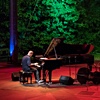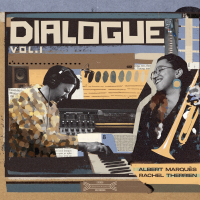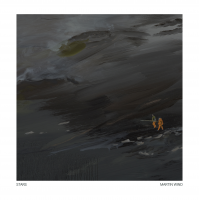Home » Jazz Articles » Album Review » Rich Halley 3: The Literature
Rich Halley 3: The Literature
It's a pretty broad set of compositions, too, not just expected contributors Miles, Mingus and Monk, but Ornette and Sun Ra as well. And Duke Ellington, plus country pioneers Jimmie Rodgers, Hank Williams and The Carter Family.
The country tunes are worth visiting first if only because Halley writes that "while we used different approaches to these tunes, we tried to retain the feeling that makes them speak authentically."
"Motherless Children" is actually miscredited to Alvin Pleasant "A.P." Carter, patriarch of The Carter Family. While The Carter Family did record the song in 1929, it was written and released two years earlier by bluesman Blind Willie Johnson. Halley's version opens with a solo of the main theme by bassist Clyde Reed before Halley and his son, drummer Carson Halley, join in with Rich Halley taking over the theme on sax. After another verse, they break it wide open, deconstructing the melody into Louis Prima-styled wailing before Carson rebuilds it and brings it back to center on drums, as Rich and Reed join him to close it out. It's absolutely lovely, true to Johnson's original and the Carter Family's interpretation as well.
Rodgers' "High Powered Mama" also opens with Reed delineating the main melody on bass before Rich Halley joins in on sax, playing it slow like an old torch song. In his sleeve notes, Rich Halley mentions the collaborations between Rodgers and Louis Armstrong in the 1920s, and the opening arrangement here isn't too far off from what a sax trio from that era might have done with this song. Of course, a man who cites Sun Ra and Ornette Coleman as influences can't stick with a straight-ahead homage for too long, and about half-way through the five-minute track, he begins to extrapolate off the theme before handing it back to Reed for his own solo.
"Someday You'll Call My Name"—which Hank Williams made a hit for composers Jean Branch and Eddie Hill—is opened with Halley's tenor taking the vocal part, Reed and Carson Halley swinging gently behind him for two verses. They vamp off the theme after that, before wrapping it up.
Ellington's "Mood Indigo" is the next most traditional song on this set, and Halley and group tackle it similarly to the way they approached the country-western material, a restrained, respectful opening that builds on the familiar theme. At six-and-a-half minutes, this is the second longest track here, and yet Halley never gets too far off the beaten path, despite a lengthy lead. His deep, throaty playing recalls that of Paul Gonsalves, whose lead anchored the Ellington version for decades.
A cover of Dizzy Gillespie's "Chano Pozo" doesn't really capture the polyrhythms of Cuba the way Gillespie's band could. It's a nice reading, but not what you'll take away from this album.
The two Thelonious Monk covers, "Misterioso" and "Brilliant Corners," and two Ornette Coleman songs ("Law Years," "Broad Way Blues") are where the band sounds perhaps most at home—taking the melodies as a starting point and cornerstone, but then letting loose some inspired freeform improvisation. "Kingdom of Not" by Sun Ra is mostly a loosely structured jam, but then, so is the original! Halley takes Ra's piano lead, and plays it on sax here, but shows far less fealty to the original than on any other track.
For his celebration of Miles Davis, Halley selects a fairly obscure cut, "Little Willie Leaps," which was recorded in 1947! His homage to Charles Mingus is no less rare, "Pussy Cat Dues," which was originally recorded in 1959. Neither is nearly as recognizable as the Ellington or country songs, but both are played with spirit and energy -although it's tougher to hear the original in Halley's versions.
It's a fun recording overall, full of humor and performed with high energy and sharp playing.
Track Listing
Little Willie Leaps; Misterioso; Chano Pozo; Broad Way Blues; High Powered Mama; Mood Indigo; Brilliant Corners; Motherless Child; Pussy Cat Dues; Kingdom Of Not; Someday You'll Call My Name; Law Years.
Personnel
Rich Halley
saxophone, tenorRich Halley: tenor saxophone, clapping; Clyde Reed: bass; Carson Halley: drums, clapping.
Album information
Title: The Literature | Year Released: 2018 | Record Label: Pine Eagle Records
Tags
PREVIOUS / NEXT
Rich Halley Concerts
Support All About Jazz
 All About Jazz has been a pillar of jazz since 1995, championing it as an art form and, more importantly, supporting the musicians who make it. Our enduring commitment has made "AAJ" one of the most culturally important websites of its kind, read by hundreds of thousands of fans, musicians and industry figures every month.
All About Jazz has been a pillar of jazz since 1995, championing it as an art form and, more importantly, supporting the musicians who make it. Our enduring commitment has made "AAJ" one of the most culturally important websites of its kind, read by hundreds of thousands of fans, musicians and industry figures every month.






















